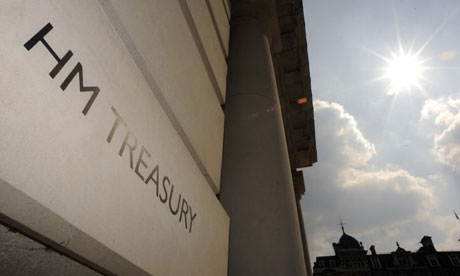UK monthly budget deficit soars to record £16bn
At the end of August public sector net debt was £804.8bn, equivalent to 57.5% of gross domestic product
- guardian.co.uk, Friday 18 September 2009 10.16 BST
- Article history

The record deficit piles pressure on Alistair Darling to cut public spending. Photograph: Toby Melville/Reuters
Britain's budget deficit widened to a record £16bn last month, £6bn worse than in August last year and worse than the City had expected, official data showed today.
The news comes as the chancellor, Alistair Darling, begins talks with his cabinet colleagues to discuss areas in which public spending may be cut. Darling's pre-budget report in November is likely to outline a programme to reduce the deficit sharply over the coming years.
For the first five months of the fiscal year 2009/10, the budget was in the red to the tune of £65bn, far higher than the £26bn shortfall seen in the same period last year.
The figures will add to growing fears that Darling's budget forecast of a full-year deficit of £175bn is likely to be exceeded as rising unemployment and tumbling tax receipts due to the recession take a heavy toll on the public finances. Earlier this week Gordon Brown admitted for the first time that Labour would make cuts in public spending if it wins the election next year.
Neil Rutledge of consultants Grant Thornton said: "This week's spending cut announcement was the inevitable culmination of the vast growth in public debt. The question has never been whether there will be cuts, but where the cuts will be made. The real test will come in making deep but effective cuts whilst identifying ways to maintain key public sector services in a more cost efficient way.
"Public sector debt will continue to remain at the top of the government agenda. It will be vital to reduce debt levels to avoid long-term damage and a loss of confidence from the international community."
The breakdown of the figures showed that tax receipts so far this year are down nearly a quarter while government spending – on things like jobless benefits – is up 11%.
At the end of August public sector net debt was £804.8bn, equivalent to 57.5% of gross domestic product, although analysts say the national debt will soon exceed 80% of GDP. A year ago it was £633bn, or 44% of GDP.
Colin Ellis, economist at Daiwa Securities, warned that the fragile state of the economy meant either of the main parties would be unwise to tighten fiscal policy too rapidly.
"With households already keeping a tight grip on their purse strings, and unemployment still rising, fiscal retrenchment could pose a risk to the gradual pace of recovery," he said.

No comments:
Post a Comment